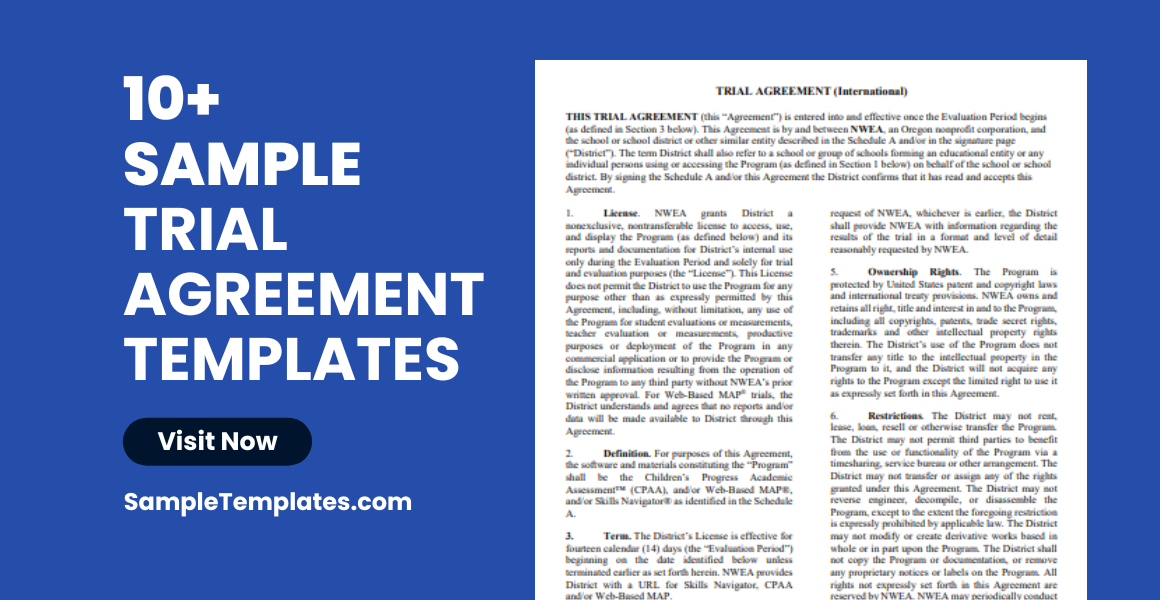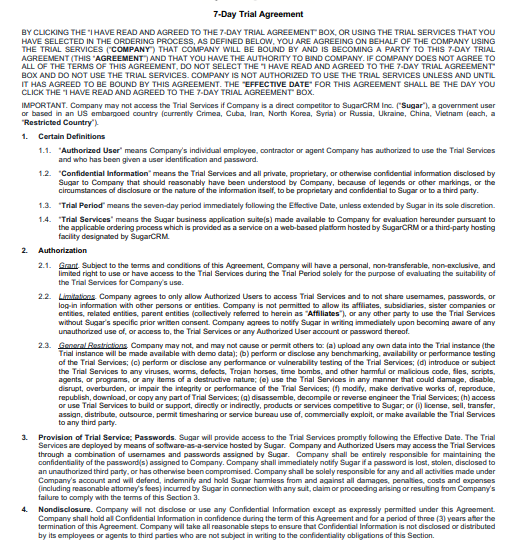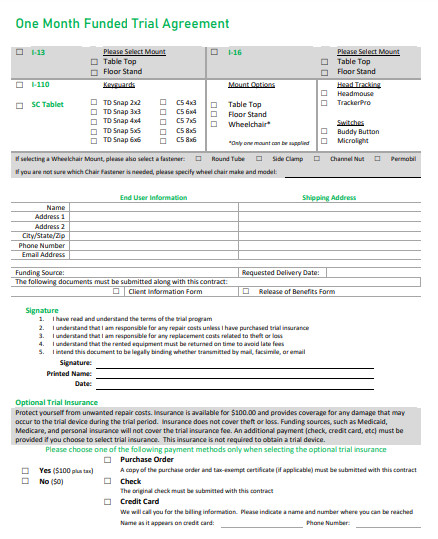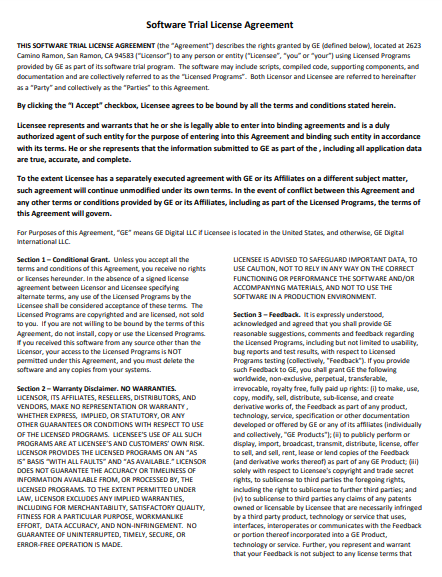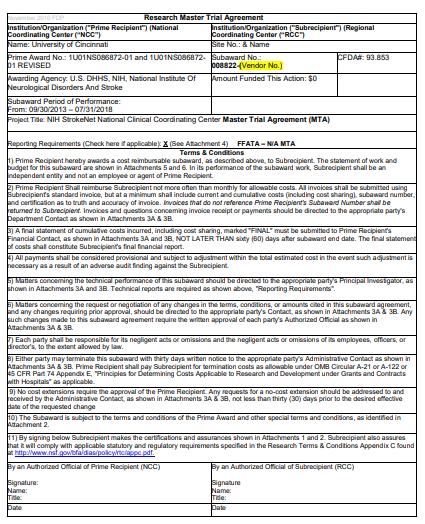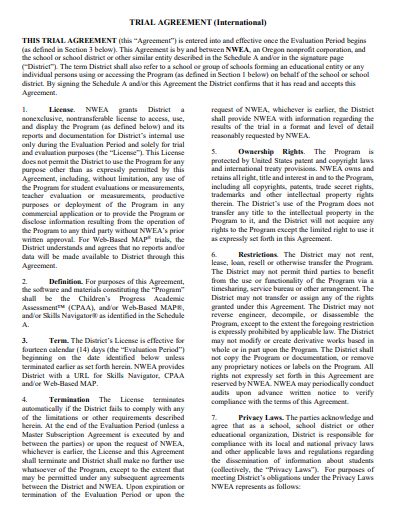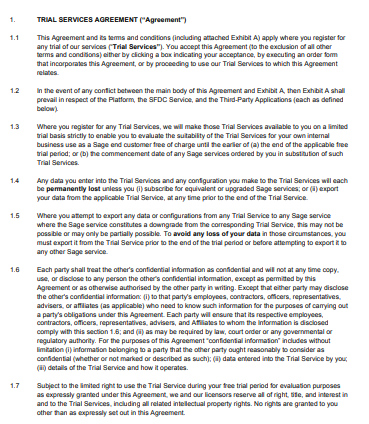Embarking on a new venture or partnership often necessitates a well-structured Trial Agreement. This essential document serves as a safeguard, outlining the terms and conditions of a trial period before finalizing a commitment. Whether it’s for business collaborations, service trials, or product testing, a Trial Agreement ensures clarity and mutual understanding. Our guide provides an in-depth look at crafting effective agreements, tailored to meet specific needs while ensuring legal compliance and protecting all parties involved.
10+ Trial Agreement Samples
1. Sample Work Trial Agreement Template
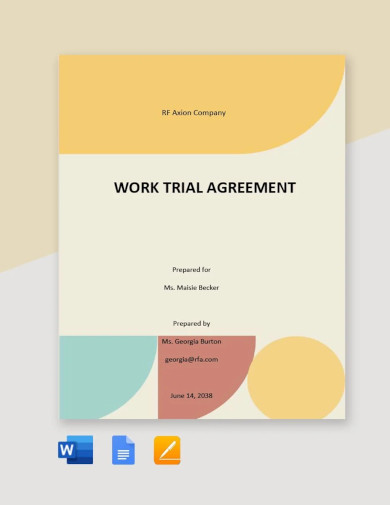
2. Sample Product Trial Agreement Template
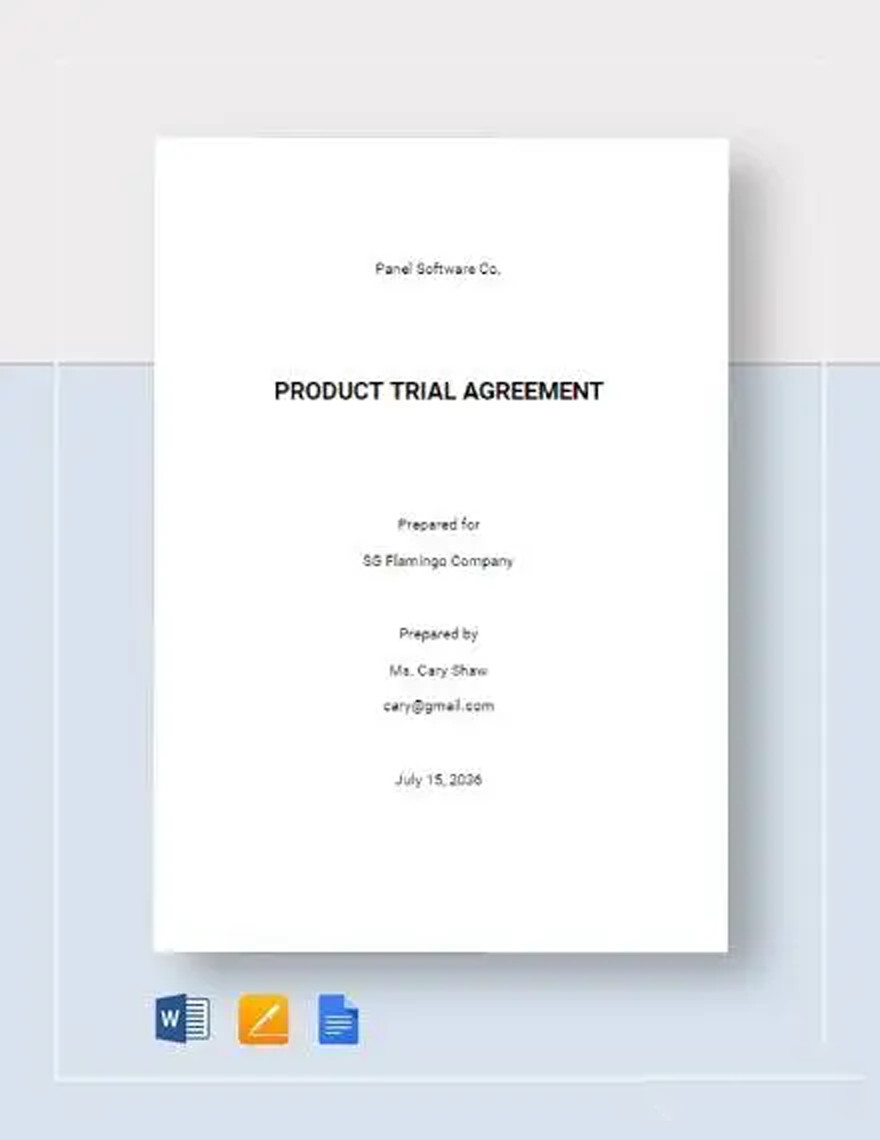
3. Sample Equipment Trial Agreement Template
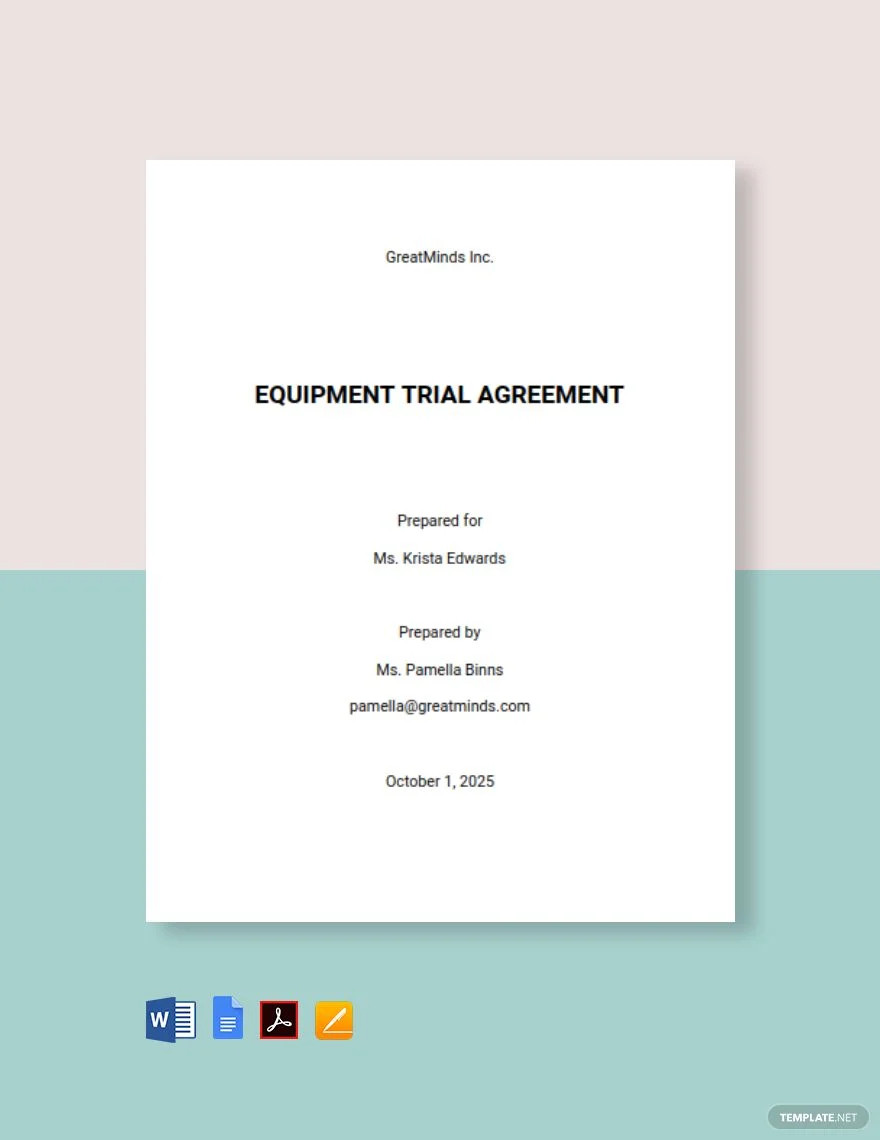
4. Sample Clinical Trial Agreement Template
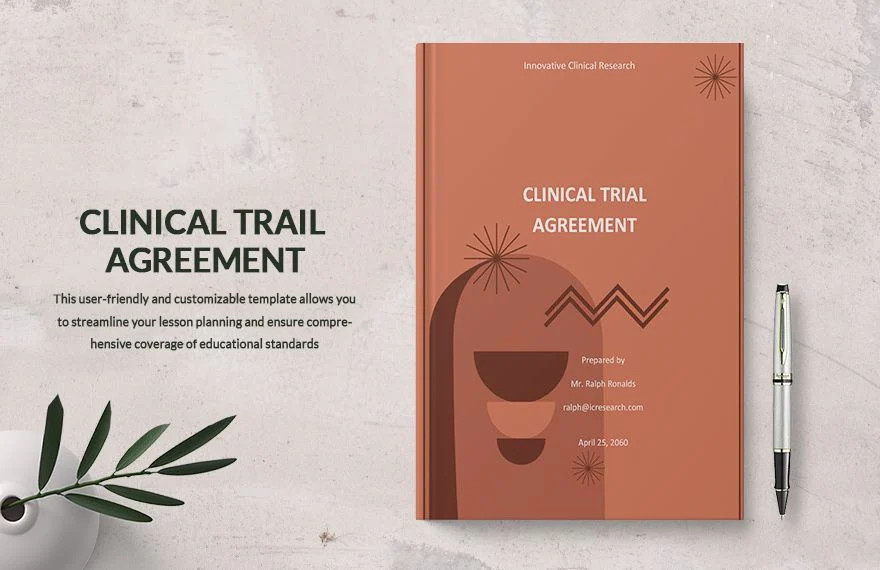
5. Sample Software Trial Agreement Template
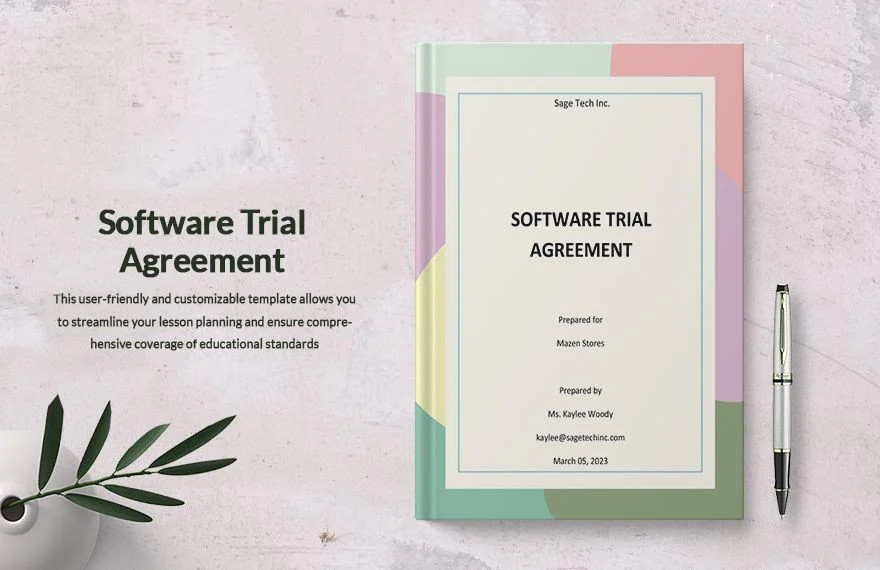
What is a Trial Agreement?
Understanding Trial Agreements
A trial agreement is a crucial legal document used in various fields, particularly in research, software development, and product testing. It outlines the terms and conditions under which a trial or test will be conducted. This agreement serves as a legal binding contract between the entity providing the service or product (the provider) and the entity receiving it (the recipient) for a trial period.
Essence and Purpose
The essence of a trial agreement lies in its ability to define the scope, limitations, and expectations of both parties involved in a trial. Its primary purpose is to ensure that both the provider and the recipient are clear about the trial’s sample objectives, duration, and what each party is responsible for. This clarity helps in managing expectations and reduces the risk of misunderstandings.
Components of a Trial Agreement
A trial agreement is a complex document that serves as the backbone for conducting trials in various fields such as pharmaceuticals, technology, and research. Understanding its components is crucial for drafting an effective sample agreement that meets the needs of all parties involved. Each component plays a specific role in ensuring the trial is conducted smoothly, ethically, and legally.
1. Preamble and Definitions
- Preamble: Sets the context of the agreement, introducing the parties and the trial’s purpose.
- Definitions: Clarifies terms used throughout the document to prevent ambiguity.
2. Scope and Objectives of the Trial
- Outlines what the trial will cover and its primary goals.
- Details the specific aspects or features being tested.
3. Duration and Timeline
- Specifies the start and end dates of the trial.
- Includes milestones and interim deadlines, if applicable.
4. Roles and Responsibilities
- Clearly delineates the duties and obligations of each party.
- May include provisions for subcontractors or third-party participants.
5. Standards and Procedures
- Describes the methodologies and protocols to be used in the trial.
- Ensures consistency and reliability in the trial execution.
6. Data Management and Reporting
- Details how data will be collected, stored, analyzed, and reported.
- Addresses data privacy and security measures.
7. Intellectual Property (IP) Rights
- Defines how IP generated during the trial will be handled.
- Includes ownership rights and usage permissions.
8. Confidentiality and Non-Disclosure
- Protects sensitive information shared during the trial.
- Outlines the obligations of parties to maintain secrecy.
9. Compliance and Legal Considerations
- Ensures the trial adheres to relevant laws, regulations, and ethical standards.
- May include compliance with industry-specific guidelines.
10. Funding and Resources
- Details the financial aspects, including funding sources and sample budget allocations.
- Specifies resource contributions from each party.
11. Risk Management and Liability
- Identifies potential risks and outlines mitigation strategies.
- Addresses liability and insurance requirements.
12. Amendments and Termination Clauses
- Sets the terms for making changes to the agreement.
- Defines conditions under which the trial or agreement can be terminated.
13. Dispute Resolution
- Outlines the process for resolving disagreements or conflicts.
- May include arbitration or mediation clauses.
14. Signatures and Execution
- Formalizes the agreement with the signatures of authorized representatives.
- Indicates the date of execution and any conditions for the agreement’s activation.
Elements to Consider
Key elements to consider when drafting a trial agreement include:
- Liability and Indemnification: Clauses that define the liability of each party and indemnification in case of losses.
- Data Protection: How data generated during the trial will be handled, especially important for software and technology trials.
- Intellectual Property Rights: Clarification on the ownership of intellectual property during and after the trial. You can also see more templates like Work Trial Agreement Samples.
Importance of Trial Agreements
Trial agreements are vital for:
- Protecting Intellectual Property: They help in safeguarding the proprietary information of the product or service being trialed.
- Legal Clarity: Providing a legal framework that can be referred to in case of disputes.
- Setting Expectations: Clearly outlining what each party can expect from the trial.
Benefits of Well-Structured Trial Agreements
Well-structured trial agreements are essential in various sectors, particularly where research, development, and testing are involved. These format agreements serve as a foundation for successful trials, offering numerous benefits that extend beyond mere legal compliance. Understanding these benefits is crucial for organizations and individuals involved in trial processes.
Key Benefits of Well-Structured Trial Agreements
1. Clear Expectations and Roles
- Establishes a clear understanding of each party’s responsibilities and obligations.
- Prevents misunderstandings by outlining roles, duties, and expectations.
2. Risk Management
- Identifies potential risks and outlines strategies for mitigation.
- Protects parties against unforeseen circumstances, reducing liability and exposure.
3. Intellectual Property Protection
- Clearly defines how intellectual property is handled, ensuring proper ownership and use rights.
- Prevents disputes over inventions, data, and other intellectual outputs.
4. Legal and Regulatory Compliance
- Ensures that the trial adheres to relevant laws, regulations, and ethical standards.
- Reduces the risk of legal issues that could arise from non-compliance.
Challenges in Drafting Trial Agreements
- Balancing Interests: Ensuring that the agreement is fair and balanced for both parties.
- Complexity: Dealing with the complexity of terms, especially in technical trials.
- Legal Compliance: Ensuring the agreement complies with relevant laws and regulations.
Considerations and Best Practices
- Tailor to Specific Needs: Customize the agreement to suit the specific trial and parties involved.
- Seek Legal Advice: Consult with legal professionals to ensure the agreement is sound and enforceable.
- Clarity and Conciseness: Make sure the agreement is clear, concise, and understandable to all parties.
Example Scenario
Imagine a software company, SoftTech, entering a trial agreement with a retail business, RetailCorp, to test a new inventory management system. The trial agreement would outline the duration of the trial (e.g., 3 months), the responsibilities of SoftTech (e.g., providing technical support) and RetailCorp (e.g., providing feedback and data), confidentiality terms, and conditions for termination. It would also detail how data generated during the trial will be handled and the intellectual property rights concerning the software.
Usage Instructions
- Review Thoroughly: Both parties should thoroughly review the agreement.
- Negotiate Terms: If necessary, negotiate terms to ensure mutual benefit and understanding.
- Sign and Date: Once agreed upon, both parties should sign and date the agreement.
- Adhere to the Agreement: Throughout the trial, both parties should adhere to the terms set out in the agreement. You can also see more templates like Clinical Trial Agreement Samples.
6. Sample 7-Day Trial Agreement Template
7. Sample One Month Funded Trial Agreement
8. Sample Software Trial License Agreement Template
9. Sample Research Trial Agreement Template
10. Sample Product Trial Agreement Template
11. Sample Trial Services Agreement Template
How do you Create a Trial Agreement?
Creating a trial agreement is a critical process that requires careful consideration and attention to detail. It involves several steps, from understanding the trial’s objectives to ensuring legal compliance and protecting the interests of all parties involved. You can also see more templates like Trial Separation Agreement Samples. A well-crafted trial agreement serves as a roadmap for the trial, outlining roles responsibilities, and procedures.
1. Identify the Purpose and Scope
- Clearly define the objectives and scope of the trial.
- Determine what the trial aims to achieve and its boundaries.
2. Involve Relevant Stakeholders
- Engage all parties who will be involved in the trial.
- Ensure that each party’s interests and concerns are considered
3. Draft the Agreement Structure
- Outline the main sections and components of the agreement.
- Include sections on objectives, roles, responsibilities, timelines, and compliance.
4. Define Roles and Responsibilities
- Clearly delineate the duties and obligations of each party.
- Specify the roles of primary participants and any third-party contributors.
5. Establish Trial Procedures and Protocols
- Detail the methodologies, standards, and protocols to be followed.
- Ensure these procedures align with industry best practices and regulatory requirements.
6. Outline Data Management Policies
- Describe how data will be collected, stored, analyzed, and reported.
- Address data privacy, security, and ownership issues.
7. Detail Intellectual Property Rights
- Define how intellectual property created during the trial will be handled.
- Include provisions for ownership, usage, and licensing.
8. Incorporate Legal and Compliance Clauses
- Ensure the agreement adheres to relevant laws and regulations.
- Include clauses related to compliance, confidentiality, and liability.
9. Plan for Risks and Liabilities
- Identify potential risks and sample outline mitigation strategies.
- Address insurance requirements and liability issues.
10. Set Terms for Amendments and Termination
- Define the process for making changes to the agreement.
- Establish conditions under which the trial or agreement can be terminated.
11. Include Dispute Resolution Mechanisms
- Outline procedures for resolving conflicts or disagreements.
- Consider including arbitration or mediation clauses.
12. Review and Revise the Draft
- Conduct thorough reviews and revisions of the draft agreement.
- Seek feedback from all parties and legal counsel.
13. Finalize and Execute the Agreement
- Once all parties agree, finalize the document.
- Obtain signatures from authorized representatives of each party.
Who Should Be Involved in Creating a Trial Agreement?
Typically, the parties involved in the trial should participate in creating the agreement. This includes the entity conducting the trial, any sponsors or funders, and possibly third-party participants. Legal counsel is also crucial to ensure the agreement is legally sound.
How Long Does a Trial Agreement Last?
The duration of a trial agreement is typically defined within the document itself and varies depending on the nature and scope of the trial. It should specify the start and end dates, along with any conditions that might extend or shorten the trial period.
Can a Trial Agreement Be Modified?
Yes, trial agreements can be modified, but any changes should be agreed upon by all parties. The agreement should include clauses that outline the process for making amendments.
Is a Trial Agreement Legally Binding?
Yes, a trial agreement is a legally binding document. All parties must adhere to its terms, and failure to do so can result in legal consequences.
In Conclusion, trial agreements are more than legal necessities; they are foundational tools that ensure the success and integrity of trial phases in various industries. Crafting these agreements requires a deep understanding of the trial’s nature, a balance of interests, and a keen eye for detail to ensure they are comprehensive, clear, and legally sound. With the right approach, trial agreements can significantly contribute to the successful outcome of research and development projects. You can also see more templates like Trial Software License Agreement Samples.
